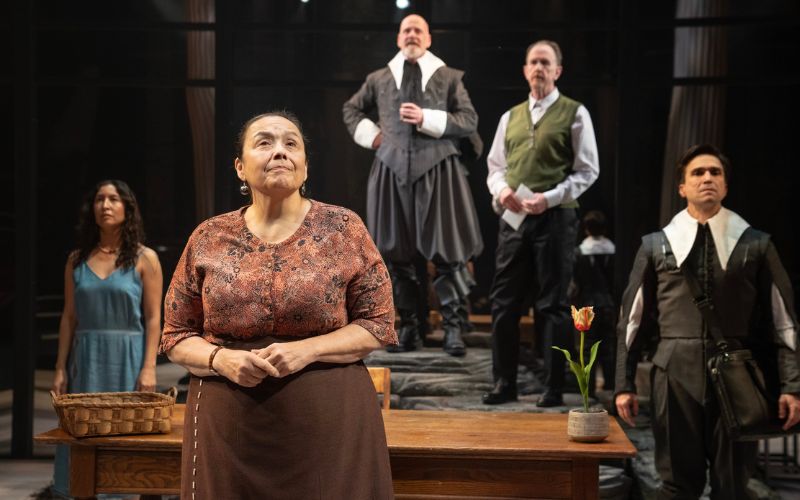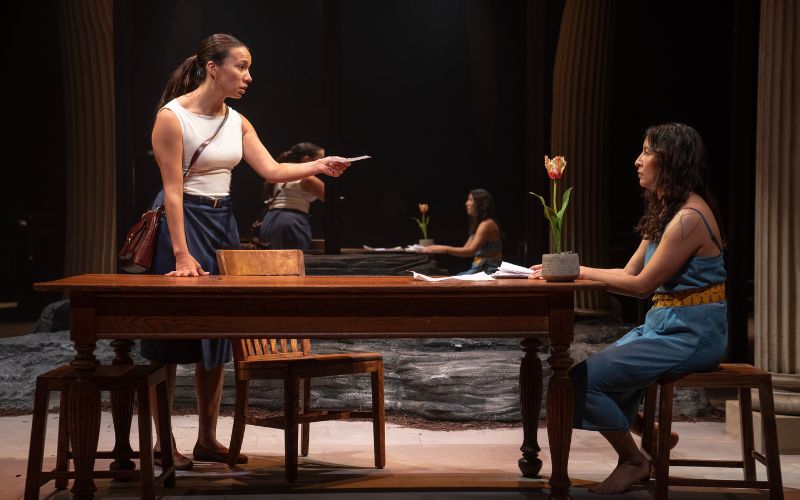
- Details
- By Jenna Kunze
NEW YORK—One of Indian Country’s most produced playwrights, Mary Kathryn Nagle (Cherokee), premiered her play MANAHATTA about the Indigenous history of Manhattan at The Public Theatre on November 16.
The 110-minute production, directed by Laurie Woolery, tells a dual story that interweaves past and present: one of the 1600s Dutch fur trades brokering a “deal” with Lenape people for their land that eventually led to their expulsion from it; the other of Jane Snake, a present-day Lenape woman whose ancestors were moved on the Trail of Tears from Manhattan to Oklahoma. Jane, a Stanford graduate in mathematics, makes her homecoming to Manahatta — the Lenape’s original name for the island of Manhattan — to work at a bank just before the 2008 financial crisis.
Jane’s struggle to walk in two worlds—reconciling her cosmopolitan life and mounting personal greed with her Native traditions and family values—is mirrored against the story of her ancestors’ expulsion from their land by Dutch settlers.
Nagle’s double story is underscored in her decision to double-cast each actor, a trademark of the playwright’s. We see Jane, played by Elizabeth Frances, go back and forth between selling insecure housing loans from a Wall Street bank, to Le-le-wa’-you, a 17th-century Lenape woman who begins trading furs to Dutch settlers who have just arrived on the shores of Manhattan.
When Le-le-wa’-you learns to speak English in order to trade with the Dutch, she boasts to her mother that she was able to trade “four or five furs” in one day for “more” wampum. Her mother tells her, “We trade with, not for, wampum.”
The theme of the poison of capitalism is echoed into the present day when Jane’s mother’s house is under foreclosure because of a loan she cannot repay— sold to her by the very bank Jane works for. When Jane writes a check to pay off her mother’s debts, her mother—played by Sheila Tousey (Menominee and Stockbridge-Munsee)—tears it up. “Some things are not for sale,” her mother says. “So you’ll be homeless?” Jane asks. “We’re Lenape,” her mother replies. “We’re never homeless. Every time they make us leave, we carry our home with us,”
The purpose of having one character play two parts, Nagle told Native News Online, is to show that history is non-linear and often repeats itself.
“We're linked to our past, and that can either help us be connected to our ancestors or if we haven't really investigated our past, it can be problematic because we’re just repeating it unconsciously,” Nagle said. “And that means we're repeating the harmful parts of it.”
 Elizabeth Frances and Rainbow Dickerson in the New York premiere production of MANAHATTA, written by Mary Kathryn Nagle and directed by Laurie Woolery, at The Public Theater. (Photo/Joan Marcus)
Elizabeth Frances and Rainbow Dickerson in the New York premiere production of MANAHATTA, written by Mary Kathryn Nagle and directed by Laurie Woolery, at The Public Theater. (Photo/Joan Marcus)
In the end, Jane concludes that she needs to break the repetition of the past in order to move forward.
“I studied math because I love patterns,” Jane says. “They’re reliable. Predictable. But what if we need to break them? Can we?”
Nagle said she hopes that the play’s ending inspires viewers to apply the same introspection to their own lives.
“The hope is really that Native people will feel that the story has resonance for them,” Nagle said. “For non-Native people, I hope they connect, too. Maybe they start to see Native people as more humanized. I hope people, beyond the Native-non-Native dichotomy, think of what Jane’s asking at the end of the play and how that factors into their lives.”
For Nagle, the play—which she began writing in 2012 while a part of the Emerging Writing Group at The Public Theater in New York—takes inspiration from the authentic history of the Delaware Nation and her personal experiences as a Native woman.
Nagle and her team consulted with Lenape Center director Joe Baker, a member of the Delaware Tribe. The playwright also collected oral histories from Lenape people. Baker told Native News that he encourages everyone to come see the play.
“I think it will illuminate and excite people to know more about this history,” he said.
And while Nagle herself isn’t Lenape and didn’t study math at MIT—she does admit to sharing some similarities with Jane Snake. Nagle left home in Missouri to study peace and justice studies as an undergrad at Georgetown University in Washington D.C. She then studied law at Tulane University in New Orleans before moving to Manhattan in 2010 to work for a law firm as a young professional.
“I felt that pull of: I’m leaving home, and for what purpose, and what does it mean to try to achieve something in this white world?,” Nalge siad. “Am I losing who I am, or am I actually accomplishing something for my Nation and for Native people? I think that's a question that a lot of Natives who go live in urban areas ask [themselves].”
Nagle ended up quitting that New York law firm. While pursuing professional playwriting, she worked as an Indian law attorney, filing amicus briefs to the Supreme Court on some of the most high-profile Indian law cases concerning tribal jurisdiction, sovereignty, and the safety of women and children. Similarly, her plays deal with topics of tribal sovereignty, erasure of Native people, and violence against Native women, she said.
“The law is storytelling, so is playwriting,” Nalge said. “I advocate for both, [but] if you want to [reach] millions of Americans, storytelling is much more effective for opening hearts and minds to things people did not previously know.”
Larissa FastHorse (Sicangu Lakota), the first Native American woman to have a play produced on Broadway, told Native News that she was thrilled that Nagle’s play “has come home to the land that it was written for and on.”
“She has such a talent for connecting history to current events in a way that gives it relevance to all audiences,” FastHorse said. “Whether this is new information to you or not."
The play will run at The Public Theatre in downtown Manahatta through December 23. Tickets can be purchased here.
Help us ensure that the celebration of Native Heritage never stops by donating here.
More Stories Like This
Watermark Art Center to Host “Minwaajimowinan — Good Stories” ExhibitionMuseums Alaska Awards More Than $200,000 to 12 Cultural Organizations Statewide
Zuni Youth Enrichment Project Takes Top Emerging Artist Apprentices to Phoenix for Artistic Exploration and Cultural Immersion
From Dishwasher to Award-Winning Chef: Laguna Pueblo's Josh Aragon Serves Up Albuquerque's Best Green Chile Stew
Rob Reiner's Final Work as Producer Appears to Address MMIP Crisis
Help us defend tribal sovereignty.
At Native News Online, our mission is rooted in telling the stories that strengthen sovereignty and uplift Indigenous voices — not just at year’s end, but every single day.
Because of your generosity last year, we were able to keep our reporters on the ground in tribal communities, at national gatherings and in the halls of Congress — covering the issues that matter most to Indian Country: sovereignty, culture, education, health and economic opportunity.
That support sustained us through a tough year in 2025. Now, as we look to the year ahead, we need your help right now to ensure warrior journalism remains strong — reporting that defends tribal sovereignty, amplifies Native truth, and holds power accountable.
 The stakes couldn't be higher. Your support keeps Native voices heard, Native stories told and Native sovereignty defended.
The stakes couldn't be higher. Your support keeps Native voices heard, Native stories told and Native sovereignty defended.
Stand with Warrior Journalism today.
Levi Rickert (Potawatomi), Editor & Publisher


